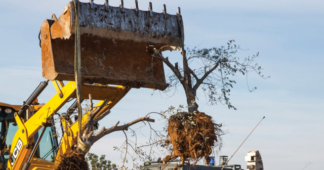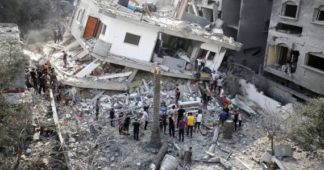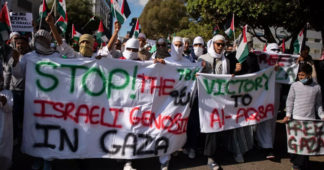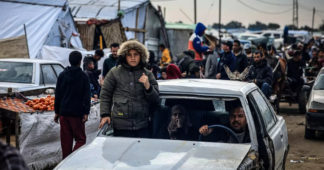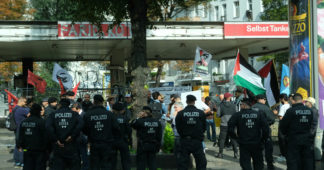After more than four months of Israel’s brutal onslaught against the besieged Palestinian people, the world must ensure Tel Aviv’s legal, economic and political isolation
By Muhannad Ayyash
Feb 26, 2024
Since Israel’s genocidal onslaught against the Gaza Strip began last October, millions of people around the world have been experiencing a kind of paralysis.
This is not necessarily an absolute paralysis. People are still able to engage in activities, such as protests, aimed at ending the genocide.
They are asking fundamental questions about everything they thought they knew – or took for granted – about their states, governments, ideologies, media, educational systems and international institutions.
We do not suffer from a lack of words to describe the realities of genocide, global imperialism and the Israeli state’s settler-colonial brutality. Such analyses are plentiful, written by scholars, journalists and activists in Palestine and beyond. South Africa’s case at the International Court of Justice is an excellent example.
We also do not suffer from an absence of actions that are capable of truly challenging status-quo power relations. Economic and political disruption is critical to forcing change, and we have seen many activist groups bravely engaging in such actions in the US, UK, Canada and elsewhere.
Indeed, the aforementioned paralysis does not disable our ability to describe the genocide and take action against it. Rather, the entrenchment and dominance of our political, economic, social, legal and cultural institutions, stops the majority of people from taking the next step to radically transform these institutions.
The task seems immeasurable, the risks high and the desired outcome not at all guaranteed. But if we are truly going to take the next step and create consequences for Israeli settler-colonialism, then the boycott, divestment and sanctions (BDS) movement must be adopted by institutions worldwide.
Colonial project
Two key reasons underlie this state of paralysis: the idea that the Palestinian cause is a lost one, and the notion that an alternative world is too risky a proposition, given all the uncertainty this would entail.
As I have written before, Palestine may be a losing cause at the moment, but it is not a lost cause. Giving up on the Palestinian struggle is nothing short of giving up on the de-colonial project, or the aspiration to usher in a world that no longer operates on global imperial structures and and where all people can live a dignified, sovereign, and free life.
If Palestinians are not free, then the Euro-American imperial and colonial project continues. That project has only one goal: to generate wealth and power for Euro-American empires (with their vassals in the Arab world and beyond). So long as this project continues, the large majority of peoples in the Global South, along with Indigenous communities and exploited peoples across the Global North, will not be free
The path towards an alternative de-colonial world will always carry a degree of uncertainty and risk. But this risk is worth it, and the Palestinian case helps explain why.
The struggle for Palestine is worth the risk because the current path poses an unacceptable certainty: genocide. If we remain on this path, the genocide of the Palestinian people will continue until only a small fraction of those living between the river and the sea are Palestinian. They will become the oppressed minority, forced to live under exclusive Israeli Jewish sovereignty.
This type of genocidal project will not stop with the Palestinian people. Israel’s current actions are sending a clear message to empires that settler-colonialism is still possible in the 21st century, and that imperial outposts in any region of the world can serve imperial interests, thus ensuring the continuation of Euro-American colonial violence.
There are consequences to genocide; people do not just forget about it and move on. Millions of people around the world now believe that this imperial world order understands only the language of force. It is impossible to predict where this might lead, but another world war is a real possibility. At some point, the peoples brutalised by US-led western imperialism will find a release valve on a mass scale.
There is no greater risk than the path we are currently treading – that of war and genocide. We need an alternative. And while that route is uncertain, we are not without a compass.
There are many excellent alternative forms of social and political organisation that we can learn from colonised peoples and regions, both historically and in the present – ones that emphasise collective well-being, participatory democracy, respect for all cultural groups, living in harmony with nature, and embracing a multitude of identities.
There is a better way forward. Let this be a moment to shed the state of paralysis and commit ourselves to a long-term struggle for Palestinian de-colonial liberation through BDS. The legal, economic and political isolation of the Israeli state is the only viable alternative to genocide and war.
We remind our readers that publication of articles on our site does not mean that we agree with what is written. Our policy is to publish anything which we consider of interest, so as to assist our readers in forming their opinions. Sometimes we even publish articles with which we totally disagree, since we believe it is important for our readers to be informed on as wide a spectrum of views as possible.
